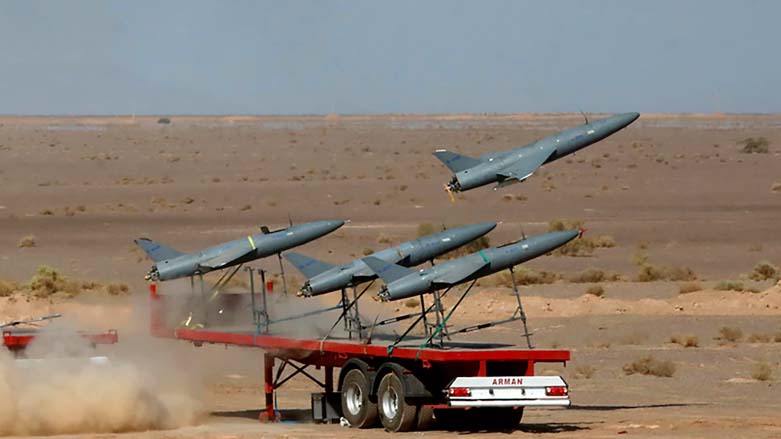US condemns Iranian drone sales to Russia; arms transfers to Houthis; failure to renew nuclear deal
The US issued a series of criticisms of the Iranian regime in Washington by State Department Spokesperson Ned Price, as well as in New York, where the UN Security Council discussed Iranian arms transfers to Russia.

WASHINGTON DC, United States (Kurdistan24) - On Monday, the US issued a series of criticisms of the Iranian regime in Washington D.C. and at the UN Security Council discussion of Iranian arms transfers to Russia.
Taken together, they represent a dramatic change in US policy toward Iran over the last few months—since September, when renewing the 2015 Iranian nuclear deal, formally known as the Joint Comprehensive Plan of Action (JCPOA), was still the top priority of the Biden administration in the region.
It is no longer.
Ukraine Officials Describe Russia’s Use of Iranian Drones to Attack Civilian Infrastructure
On Monday, Ukrainian President Volodymyr Zelensky addressed, by video conference, a summit of Northern European leaders in Latvia. He informed them of the latest intelligence regarding Iranian arms transfers to Russia—arms that the Russians are using to attack civilian targets, particularity the energy infrastructure, in his country.
Russia had recently received 250 new Shahed-136 drones from Iran, Zelensky stated. In the early hours of Monday morning, Russia launched 35 of them on the Ukrainian capital. Three days before, on December 16, a Russian drone attack on Kiev had left over 20 million people without power, Zelensky said.
The Christmas season has begun, incongruously, in Ukraine. Christmas is only five days away; even as very large numbers of Ukrainian civilians suffer in the cold and in the dark. Ukrainian forces do manage to shoot down most of the drones, but even if a fraction get through, they can cause significant damage—and the US is now prepared to attribute to Iran its share of the blame for those attacks.
Price Denounces Russia’s Use of Iranian Drones
On Monday afternoon, following Russia’s latest drone assault on Kiev, State Department Spokesperson Ned Price denounced Tehran’s weapons sales to Russia, condemning Iran for enabling Moscow’s “barbaric tactics.”
“It’s clear that these UAV’s (Unmanned Aerial Vehicles) are being used to deadly and lethal effect,” Price said. “Even when they are not lethal” immediately, during the attack, “their intent is to inflict suffering and ultimately death by depriving the Ukrainian people of heat, of water, of electricity during the winter.”
Although “in some cases,” Ukraine has “been able to shoot down more than half of these drones,” Price continued, that even “a single drone is able to evade air defense systems and inflict such damage and brutality” is “a reminder of these barbaric tactics that President Putin and his enablers, including his enablers in Tehran, are assisting.”
At UN, US Denounces Iranian Arms Sales, Failure to Negotiate JCPOA Renewal in Good Faith
A parallel US criticism of Iran took place in New York on Monday, where UNSCR 2231, which endorsed the JCPOA, was discussed. The Biden administration is open to the charge that by ignoring Iranian arms transfers to its proxies in the Middle East, it opened the door to Iranian arms transfers to Russia, which are now being used in Ukraine.
That charge could be made regarding Iranian arms transfers to pro-Iranian militias in Iraq, but the US has yet to take that on, at least publicly. However, the US envoy in New York, Amb. Robert Wood, did raise it with regards to Yemen, where Tehran has been supporting the Houthis against the Saudi-backed government.
He noted that rifles, rocket launchers, and anti-tank guided missiles in the hands of the Houthis, were likely of Iranian origin and “are a threat to regional security.”
USCR 2231, which runs over 100 pages, includes restrictions for a period of eight years on the transfer of a variety of weapons systems to and from Iran—which would run through July 2023.
As Wood noted, when the resolution was approved, “All Council members recognized the importance of retaining in place certain critical prohibitions on the transfer” of weapons technology to and from Iran.
The US and its European allies maintain that Iranian drone sales to Russia violate those provisions of UNSCR 2231.
Indeed, after detailing the Iranian weapons transfers to the Houthis, Wood noted that evidence had recently arisen of “even more grave violations of Resolution 2231”—namely, Iranian drone sales to Russia.
“Russia’s open violation of Resolution 2231” is especially serious, Wood explained, because it is using the Iranian drones “to attack Ukraine’s civilian infrastructure.”
“What could be crueler,” he asked, “than seeking to turn out the lights, cut off the heat, and shut down the water for millions of Ukrainian families?”
US: Iran not interested in Renewing the JCPOA; is Expanding its Nuclear Program
As part of the Security Council’s review of Resolution 2231, Wood also explained that diplomatic efforts to renew the JCPOA had ended in September. Iran was not interested, he explained. In addition, Iran has been expanding its nuclear program.
In reviewing the Biden administration’s efforts to renew the JCPOA, Wood noted that, repeatedly, it had seemed that a deal to renew the accord was “within reach.”
“All other participants in the negotiations had agreed,” he explained, but Iran would make “new demands that were extraneous to the JCPOA and that it knew could not be met.”
Those negotiations ended in September, Wood stated. “There have been no active negotiations since then.”
Wood also explained that “Iran’s repeated and long-standing failure to cooperate with the IAEA (International Atomic Energy Agency) and the expansion of its nuclear program for no legitimate civilian purpose” contributed to the US position.
